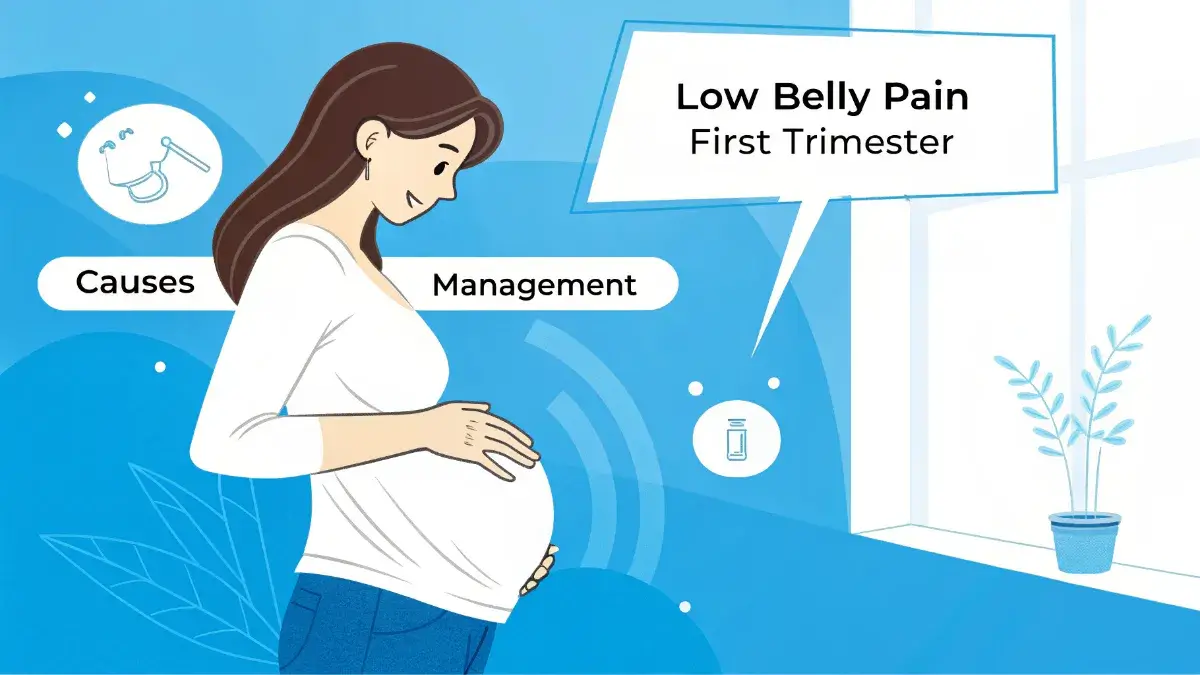Hey there, soon-to-be super moms! Congratulations on embarking on this incredible journey into motherhood. It’s a time filled with excitement, anticipation, and numerous changes happening inside your fantastic body. While you’re busy dreaming of tiny toes and sweet cuddles, you might encounter a few unexpected sensations, and one common one is low belly pain during the first trimester. Don’t worry, you’re not alone! This guide is here to help you understand what’s normal, what’s not, and how to find comfort.
Key Takeaways
- Normal Changes: Mild low belly pain is common in early pregnancy due to your uterus growing and ligaments stretching.
- Hormonal Influence: Hormones like progesterone can relax muscles, which may contribute to discomfort and digestive issues, such as gas.
- When to Worry: Severe, persistent low belly pain accompanied by bleeding, fever, or other alarming symptoms always needs immediate medical attention.
- Home Comforts: Rest, warmth, hydration, and gentle movement can often help ease mild low belly pain.
- Trust Your Instincts: Always listen to your body and don’t hesitate to contact your healthcare provider if something feels off or causes concern.
Understanding Low Belly Pain in Early Pregnancy
Imagine your body as an incredible architect, busy building a cozy, safe home for your growing baby. This fantastic process involves a lot of behind-the-scenes work, and sometimes, you might feel it as low belly pain. It’s your body’s way of saying, “Hey, big things are happening in here!”

The Expanding Uterus
One of the main reasons for low belly pain is simply your uterus growing! 🌱 In the first trimester, your uterus starts to expand from the size of a pear to a grapefruit to make room for your tiny tenant. This growth can cause mild cramping or a feeling of fullness in your lower abdomen. It’s similar to the feeling of menstrual cramps, which can sometimes be confusing.
Ligaments on the Stretch
Think of your ligaments as strong, elastic bands that hold your uterus in place. As your uterus expands, these support bands stretch and sometimes even pull. This stretching can lead to sharp, sudden pains or dull aches in your lower belly or groin area. It’s particularly noticeable when you change positions quickly, sneeze, cough, or laugh. This is often called round ligament pain, and it’s a prevalent cause of low belly pain in pregnancy.
Hormonal Symphony
Your body is like a chemical playground during pregnancy, with hormones acting as tiny but mighty messengers. One key player is progesterone. This hormone helps relax muscles throughout your body, which is crucial for your uterus to expand comfortably and prevent contractions. However, this muscle-relaxing effect can also slow down your digestion, leading to increased gas and constipation, which can undoubtedly cause low belly pain. It’s a classic case of your body’s teamwork in action, even if it comes with a few growing pains.
Common Causes of Low Belly Pain During the First Trimester
Let’s dive into the typical culprits behind those low belly pains that might be giving you the occasional “What’s going on in there?” moment. Knowing these can help ease your mind!
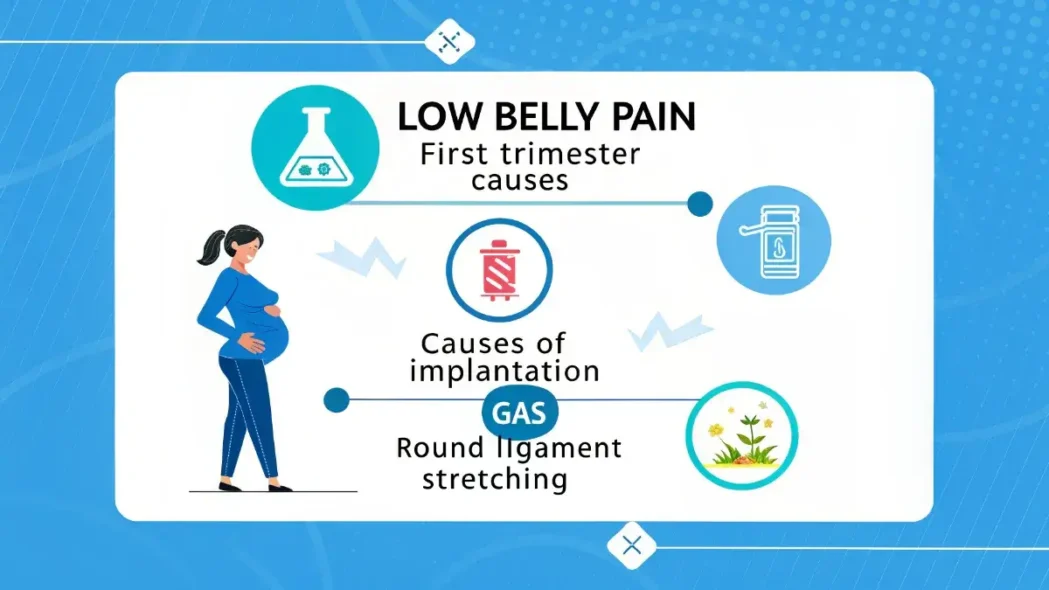
1. Stretching Uterine Ligaments (Especially Round Ligament Pain)
As mentioned, your uterus is growing, and its supporting ligaments are stretching. The round ligaments are two cord-like structures that run from the top sides of your uterus down into your groin area. When they stretch, they can cause a sharp, jabbing pain, often on one side of your lower belly or groin, especially with sudden movements. It’s usually brief but can be quite startling!
2. Implantation Cramping
In the very early weeks of pregnancy, as the fertilized egg snuggles into your uterine lining, it can cause some mild low belly discomfort or light spotting. This is known as implantation cramping. It’s usually very mild, lasts only a day or two, and feels like light menstrual cramps. It’s your body’s way of saying, “We’re making room for the VIP guest!” 👶
3. Gas and Constipation
Yes, we’re diving into the not-so-glamorous stuff, but it’s essential to keep it real! Hormonal changes (hello, progesterone!) during pregnancy can slow down your digestive system. This can lead to uncomfortable gas buildup, bloating, and constipation, all of which can cause significant lower belly pain. Eating certain foods or not drinking enough water can exacerbate the condition.
4. Growth Pains
You recall the growing pains of your teenage years. Well, it turns out pregnancy can bring its version too! As your uterus expands and your baby starts to develop rapidly, you might experience some general low belly discomfort akin to those classic growing pains. It’s a sign your body is actively working to accommodate new life.
5. Hormonal Havoc
Beyond slowing digestion, the surge of hormones can lead to increased blood flow to your pelvic area. This increased blood flow can cause some extra sensitivity, fullness, and occasional discomfort in your lower abdomen.
6. Urinary Tract Infections (UTIs)
UTIs are surprisingly common during pregnancy because hormonal changes can make it easier for bacteria to grow in the urinary tract. A UTI can cause low belly pain or pressure, pain or burning during urination, frequent urination, and sometimes fever or chills. If you suspect a UTI, it’s essential to get it treated quickly to prevent more serious complications.
“Your body is doing an incredible dance of creation. Mild low belly pain is often just a part of the choreography.”
Normal vs. Concerning Low Belly Pain: What to Watch For
Let’s be real, growing a human is a monumental task, and your body deserves a round of applause for all the work it’s doing behind the scenes. With this incredible journey comes a few bumps, or in this case, aches and twinges. Mild discomfort is often a badge of honor for moms-to-be, indicating that your body is adapting to the magical transformation within.
The Ache-o-Meter: Normal Discomfort
Normal low belly pain typically falls on the lighter side of the “ache-o-meter.” It’s like the sensation after a good workout, a minor soreness, a dash of stretching, and a sprinkle of tenderness. It’s usually:
- Mild to moderate: Not severe or debilitating.
- Intermittent: Comes and goes, rather than being constant.
- Relieved by rest: It often eases when you lie down or change positions.
- Accompanied by no other symptoms: No bleeding, fever, or dizziness.
Here’s a quick comparison to help you tell the difference:
| Feature | Normal Low Belly Pain (First Trimester) | Concerning Low Belly Pain (First Trimester) |
|---|---|---|
| Intensity | Mild to moderate cramping, dull ache, sharp but brief twinges. | Severe, intense, excruciating, or worsening pain. |
| Duration | Intermittent, comes and goes, often brief (e.g., round ligament pain). | Constant, doesn’t go away with rest, gets worse over time. |
| Location | General lower abdomen, one side (round ligament), or central. | Localized to one side (especially if sharp), radiating pain. |
| Accompanying Symptoms | Often relieved by rest, position change, warm bath, and hydration. | Vaginal bleeding (spotting to heavy), fever, chills, dizziness, fainting, shoulder pain, painful urination, severe nausea/vomiting. |
| Relief | Often relieved by rest, position change, warm bath, hydration. | Not relieved by rest or simple measures; often worsens. |
When to Raise the Flag: Concerning Pain
Now, here’s the lowdown on when to raise an eyebrow and consider that it might be time for some expert advice. If your pain is cranked up to a 10 on the “ache-o-meter,” if it’s persistent and unrelenting, or if it’s partnered with bleeding, it’s time to tap into that pregnancy superhero team: your healthcare provider.
The unwelcome visitors that might send up a red flag include:
- Sharp and Shooting: If your pain feels like a lightning bolt shooting through your belly and is constant or worsening.
- One-Sided Pain: Pain that’s isolated to one side of your belly, especially if it’s severe, could be a sign of something like an ectopic pregnancy (where the fertilized egg implants outside the uterus). This is a medical emergency.
- Pain with Other Symptoms: If your pain is accompanied by symptoms such as fever, chills, heavy bleeding (more than spotting), tissue passing, severe dizziness, fainting, or severe nausea/vomiting, don’t hesitate to seek medical attention. Your body has a unique way of speaking up when something’s amiss.
- Painful urination can be a sign of a urinary tract infection (UTI), which requires prompt medical attention.
When to Seek Medical Attention for Low Belly Pain
Incredible moms-in-the-making! Let’s discuss a topic that’s all about ensuring your peace of mind during this fantastic journey – knowing when it’s time to hit the brakes and seek expert advice. We’re exploring the key indicators that suggest when your low belly pain may necessitate a professional evaluation. So, buckle up, and let’s navigate the path together.
The Critical Signals:
- The Rule of Persistent Pain: While aches and discomfort are familiar companions, if your low belly pain persists like an uninvited guest who just won’t leave, it’s time to make that call. Persistent pain that doesn’t show any signs of packing up should be on your radar.
- The Intensity Factor: Pain is like a spectrum, ranging from a gentle reminder to a full-blown distress signal. If your low belly pain registers on the “ouch” scale as intense or severe, it’s your body’s way of sending an important message. Don’t hesitate to heed the call and contact your healthcare provider.
- Team Bleeding and Pain: Now, here’s a combo that raises eyebrows – pain paired with bleeding. Your body loves to communicate through different channels, and this combination might be its way of sending an SOS. Whether it’s spotting, heavier bleeding, or any form of discharge that doesn’t feel right, consider it a cue to dial up your healthcare provider. This could be a sign of miscarriage or ectopic pregnancy.
- Sharp, Unpredictable Pains: If you’re experiencing sharp, unpredictable pains that make you double over, especially if they are localized to one side or accompanied by shoulder pain (a sign of internal bleeding from an ectopic pregnancy), it’s time to put those detective skills to use and seek professional guidance.
- Pain with Fever or Chills: If your low belly pain comes with a fever (100.4°F or higher) or chills, it could indicate an infection, such as a severe UTI or another underlying issue.
- Dizziness or Fainting: These symptoms, especially when combined with low belly pain and/or bleeding, could be signs of a serious condition like an ectopic pregnancy or internal bleeding. Seek emergency care immediately.
- Painful Urination or Changes in Urination: If your low belly pain is accompanied by burning, stinging, or pain when you pee, or if you feel the need to urinate constantly, it’s likely a UTI. This needs prompt attention to prevent kidney infection.
The Superheroes of Prenatal Care
Your healthcare provider isn’t just a contact in your phone; they’re your ally in this journey. If you find yourself nodding along to any of the above scenarios, don’t hesitate to give them a call. They have the knowledge, experience, and insight to guide you through any uncertainties and provide the reassurance you deserve. Remember, it’s always better to be safe than sorry when it comes to your health and your baby’s.
Managing Low Belly Pain at Home: Tips for Comfort
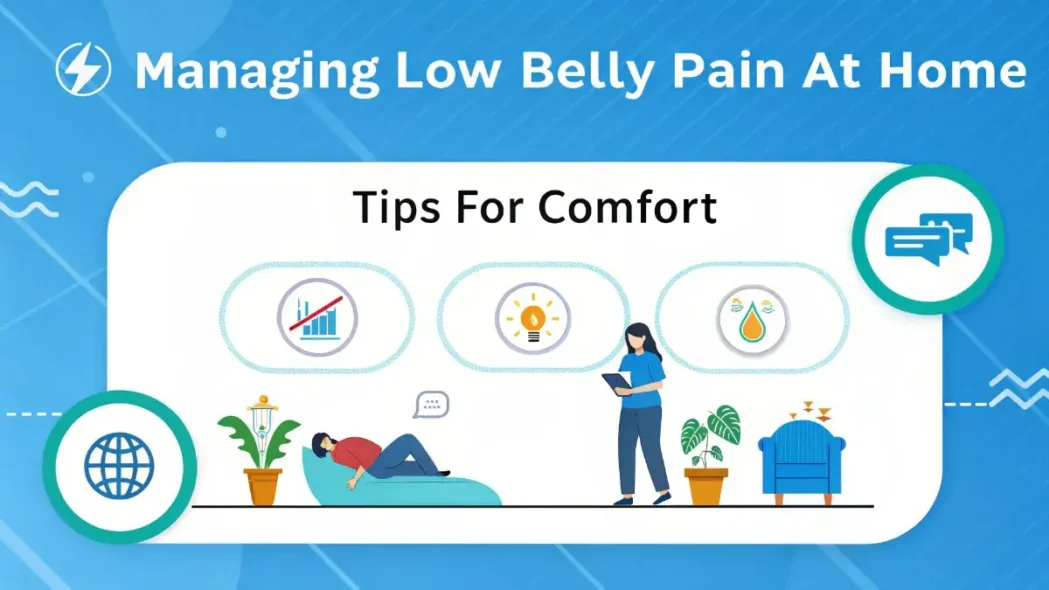
Hello there, amazing moms-to-be! Let’s chat about something that’s all about giving you a little TLC during your exciting journey, managing and soothing the occasional low belly discomfort that can arise during the first trimester. Get ready for some practical and oh-so-comfy tips that will have you feeling like a pampered queen.
1. Warm Embrace of Heat:
Remember that magical feeling when you wrap yourself in a warm, cozy blanket? Well, your belly deserves the same treatment. A gentle warm compress or a heating pad (on a low setting, never too hot!) can work wonders to soothe those aching muscles and improve blood flow. A warm bath can also be incredibly soothing. Just make sure the water isn’t too hot, and avoid prolonged soaking in very hot water.
2. Gentle Stretches and Movement:
Think of your body as a friendly rubber band that’s going through some pretty amazing stretches. Incorporate gentle stretches that focus on your lower back and abdominal area. Simple prenatal yoga poses like the cat-cow stretch can be your BFF here – it’s like a bit of massage for your muscles and helps relieve pressure from gas. Walking also helps keep the digestive system moving.
3. Hydration Nation:
Water – the elixir of life! Staying hydrated is your secret weapon against many pregnancy discomforts, including low belly pain. It helps keep things moving in your digestive system, preventing constipation and bloating, and also ensures your muscles and ligaments stay supple. Aim for at least 8-10 glasses of water a day.
4. Comfy Clothes Rule:
Bid adieu to tight jeans and snug tops for a while. Opt for loose, comfy clothing that gives your belly some room to breathe and grow. Think maternity pants with soft waistbands or flowy dresses. It’s all about embracing comfort without compromising style.
5. Prenatal Pillow Magic:
Pregnancy pillows – they’re not just for Instagram-worthy nursery photos. These snuggle-worthy wonders are designed to support your changing body and provide relief to your achy areas, especially when you sleep. Try different shapes and find the one that fits your body perfectly.
6. Breathe and Relax:
Ah, the power of deep breaths and relaxation techniques! When your body is a little cranky, taking a moment to breathe deeply and release tension can work wonders. Find a quiet spot, close your eyes, and let your body know that you’re giving it a break. Meditation or gentle mindfulness exercises can also help manage discomfort.
7. Dietary Adjustments for Digestion:
To combat gas and constipation, which often cause low belly pain, try these tips:
- Eat smaller, more frequent meals: This is easier on your digestive system.
- Increase fiber Intake by incorporating fruits, vegetables, and whole grains into your diet.
- Avoid trigger foods: Foods that typically cause gas (such as beans, broccoli, and fizzy drinks) may be more problematic now.
- Chew slowly: This helps prevent swallowing too much air.
The Importance of Prenatal Care for Lower Belly Pain
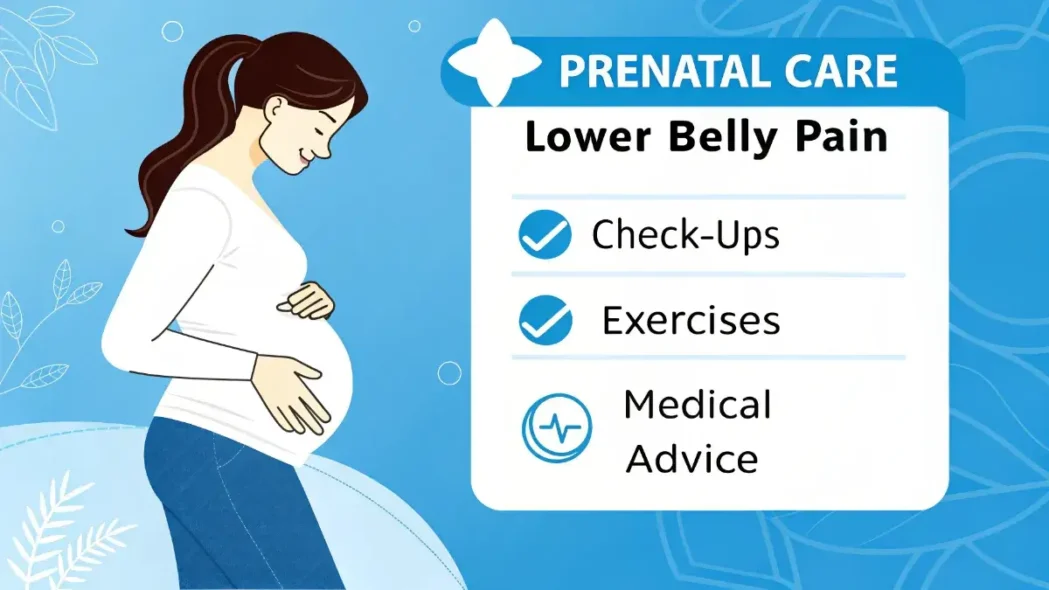
Future superstar moms! Let’s talk about something that’s your ultimate secret weapon on this exciting journey – prenatal care. Think of it as your personalized guidebook to navigating the twists and turns of pregnancy, ensuring both your well-being and your baby’s. We’re diving into why keeping those appointments and staying in touch with your healthcare provider is the best decision you can make, especially when dealing with concerns like low belly pain.
1. The Dream Team: You and Your Healthcare Provider
Picture this: you’re the captain of your pregnancy ship, and your healthcare provider is your trusty co-captain. Together, you’re steering toward a destination of a healthy pregnancy and a happy, bouncing bundle of joy. Prenatal care isn’t just a suggestion; it’s your compass to ensure a smooth journey, helping you understand and manage symptoms like low belly pain.
2. Expertise Beyond Google
Let’s be honest – Google can be a treasure trove of information, but it can also be a rabbit hole of anxiety-inducing scenarios. Your healthcare provider is your walking, talking, certified encyclopedia of pregnancy knowledge. They have the training, experience, and know-how to guide you through every bump (both literal and metaphorical) you might encounter, including diagnosing the cause of your low belly pain.
3. Personalized Care for Your Unique Journey
Every pregnancy is like a fingerprint – unique and special. What worked for your friend or that celebrity mom might not necessarily work for you. Your healthcare provider tailors their advice to suit your individual needs, medical history, and any specific concerns you might have regarding your low belly pain. They can assess your particular situation and offer the best course of action.
4. Detecting and Addressing Concerns Early
Low belly pain might be an unwelcome visitor, but with the guidance of your healthcare provider, you can show it the door. Regular check-ins enable your provider to identify potential red flags early and address them before they become significant issues. It’s like preventive medicine for a smoother journey. They can perform tests for UTIs or other conditions that might be causing your discomfort.
5. Emotional Support and Reassurance
Pregnancy is a rollercoaster of emotions, and having a healthcare provider on your side can make a significant difference. They’re not just there to monitor your physical health – they’re also there to provide the emotional support and reassurance you need when those pregnancy hormones are in full swing or when you’re worried about low belly pain. Knowing you have an expert to consult can significantly reduce stress.
6. A Safe Space for Questions
No question is too silly or too small when you’re pregnant. Your prenatal appointments are a safe space to voice all your concerns, from the mildest twinge of low belly pain to anxieties about labor. Your provider is there to answer all your questions honestly and empathetically.
7. Building Trust and Confidence
Consistent prenatal care helps build a strong relationship of trust and confidence between you and your healthcare team. This trust is invaluable as you navigate the many changes and decisions throughout your pregnancy, ensuring you feel supported and informed every step of the way, especially when addressing any low back or abdominal pain you experience.
Lifestyle Adjustments to Minimize Low Belly Pain and Discomfort
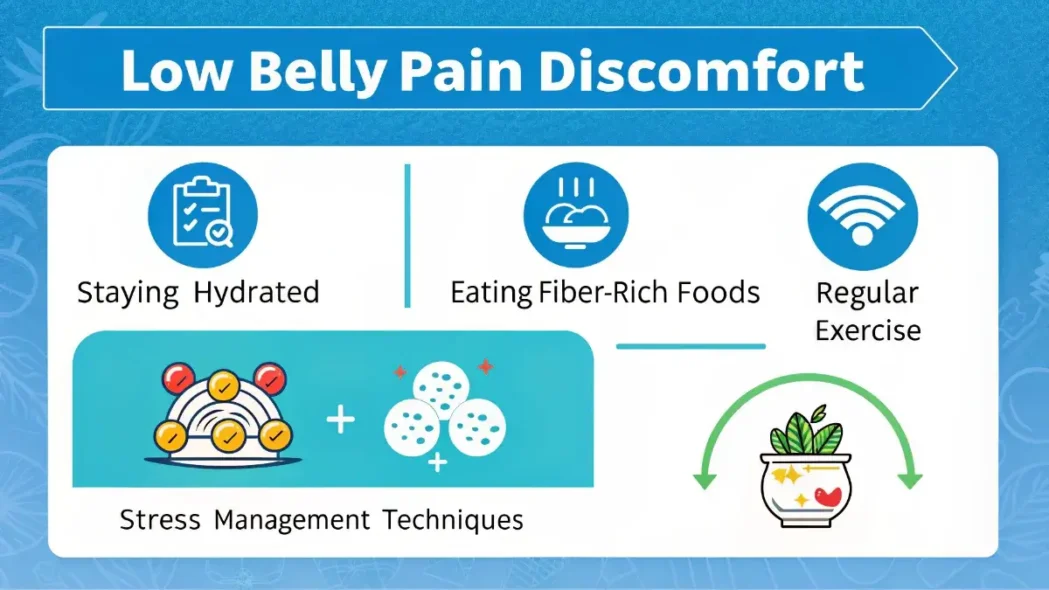
Soon-to-be superheroes of motherhood! We’re diving into a topic that’s all about making some small yet mighty changes to your lifestyle to keep those low belly pains at bay. Think of it as your superpower toolkit to ensure a smoother, more comfortable pregnancy journey. Let’s explore the lifestyle adjustments that can make a world of difference.
1. Master the Art of Posture:
Believe it or not, your posture can play a starring role in your comfort levels. Standing tall with your shoulders back and belly gently pulled in not only supports your back but also helps alleviate strain on your lower belly and ligaments. So, channel your inner ballerina and embrace that graceful posture. When sitting, use a supportive pillow for your lower back.
2. Elevate Those Feet:
If you’re on your feet a lot or notice swelling, elevating your feet whenever possible can significantly reduce pressure and discomfort in your lower body, which can sometimes contribute to overall low belly pain. Use a footrest at work or prop your feet up with pillows when relaxing at home.
3. Yoga and Gentle Exercise:
Regular, gentle exercise approved by your doctor can do wonders. Activities like walking, swimming, and prenatal yoga help strengthen your core muscles, improve flexibility, and promote good digestion, all of which can reduce low belly pain. Exercise also boosts your mood!
4. Rock That Supportive Footwear:
Your feet are carrying extra weight, and comfortable, supportive shoes are a must. They help maintain proper alignment throughout your body, reducing strain on your back, hips, and ultimately, your lower belly. Ditch the heels for now!
5. Meals Full of Goodness:
What you eat directly impacts your digestion, which is a major contributor to low belly pain from gas and constipation. Focus on:
- Fiber-rich foods, such as whole grains, fruits, and vegetables, help keep your digestive system moving smoothly.
- Smaller, frequent meals: Avoid overeating, which can lead to bloating.
- Limit gassy foods: Identify and reduce foods that cause you gas (e.g., beans, certain cruciferous vegetables, carbonated drinks).
- Stay hydrated: As mentioned, water is key for digestion.
6. Sleep Like a Queen:
Getting enough restful sleep is crucial for your body to repair and rejuvenate. A well-rested body is better equipped to handle the physical demands of pregnancy and manage discomforts, such as lower belly pain. Use pregnancy pillows to find comfortable sleeping positions, often on your side.
7. Time for Baby’s Breath:
Deep breathing exercises can help you relax and manage pain. When you feel a twinge of low belly pain, take slow, deep breaths. This can also help calm your nervous system and reduce overall tension.
8. Avoid Sudden Movements:
Sudden twisting, turning, or standing up too quickly can trigger sharp round ligament pain. Try to move slowly and deliberately, giving your ligaments time to adjust.
9. Gentle Massage Magic:
A very gentle massage on your lower belly or back can help soothe muscle tension and discomfort. You can use a pregnancy-safe lotion or oil. Always use light pressure.
10. Listen to Your Body:
Above all, pay attention to what your body is telling you. If an activity or food seems to worsen your low belly pain, try to avoid it. Rest when you need to, and don’t push yourself too hard. This journey is about nurturing yourself and your baby.
🤰 Low Belly Pain Symptom Checker (First Trimester)
This tool helps you understand if your **low belly pain** symptoms might need medical attention. It’s for guidance only and not a substitute for professional medical advice.
Select your symptoms above and click “Check My Symptoms” for guidance.
Conclusion
And there you have it – a comprehensive guide on the ins and outs of low belly pain during the first trimester. It’s all part of the adventure, a sign that your body is nurturing a new life. Remember, while mild low belly pain is a regular part of this incredible journey, your peace of mind is paramount. Don’t hesitate to contact your healthcare provider if you have any concerns or if the pain is severe, persistent, or accompanied by other concerning symptoms.
You’re not just growing a baby; you’re growing into a remarkable mom-to-be! Embrace this journey, listen to your body, and know that you’re doing a fantastic job.
FAQ’s
How does your lower stomach feel in early pregnancy?
During early pregnancy, your lower abdomen may experience a range of sensations. It’s often described as mild cramping, similar to light menstrual cramps. You may also experience a dull ache, a pulling sensation, or even sharp, brief twinges, especially with sudden movements (this is often caused by round ligament pain). Some women experience bloating or gas, which can also cause discomfort in the lower belly. These feelings are usually mild and come and go.
Is it normal to have lower tummy pain in early pregnancy?
Yes, it’s very normal to experience lower tummy pain in early pregnancy. Your body is undergoing significant changes to support your growing baby. Common causes include the expansion of your uterus, stretching ligaments (like the round ligaments), implantation cramping, and digestive issues such as gas and constipation due to hormonal changes. Most of these pains are mild, intermittent, and not a cause for concern.
Is it normal for your stomach to hurt in the first month of pregnancy?
Absolutely! Many women experience some form of stomach discomfort or low belly pain in the first month of pregnancy, often even before they confirm their pregnancy. This can be due to implantation, the early stages of uterine growth, or hormonal changes that affect digestion. As long as the pain is mild, not constant, and not accompanied by heavy bleeding or other severe symptoms, it’s typically considered normal.
Is it normal to have pain down below in early pregnancy?
Yes, it’s common to experience various types of pain down below or in the pelvic area in early pregnancy. This can include:
Low belly pain or cramping (as discussed above).
Vaginal discomfort or pressure.
Groin pain, often related to stretching ligaments.
Back pain, particularly in the lower back, occurs as your body adjusts to new weight distribution and hormones relax ligaments.
As with other pains, mild and intermittent discomfort is usually normal, but severe pain, especially with bleeding, always warrants a call to your healthcare provider.

